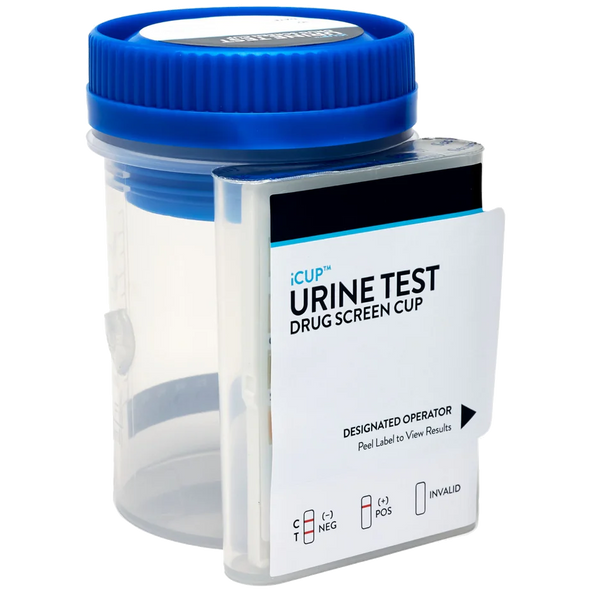Teco Diagnostics
UrineCheck 7 Drug Adulteration Test Strips, Specimen Validity Tests, 25/Bottle
Free FedEx Ground shipping on orders of $150 or more
Sales Tax Exempt? Call 800-915-7017 before ordering
- SKU:
- D700-25
- Availability:
- SHORT DATED LOT EXP- 05/15/2026
Description
Teco Diagnostics UrineCheck 7 Drug Adulteration Test Strips 25/Bottle
SHORT DATED LOT EXP- 05/15/2026
Parameters Tested
- Creatinine
- Specific Gravity
- pH
- Nitrite
- Glutaraldehyde
- Bleach
- Pyridinium Chlorochromate

Drug Test results can be blocked by commercially available "detox" kits and household products. The Drug Adulteration Test is a fast and convenient tool for assessing the integrity of urine samples prior to Drug of Abuse Testing. The test strips provide qualitative determinations of various adulterants in urine samples. An "abnormal" result signals a potentially tampered urine sample. UrineCheck 7 is exempt from FDA regulation. These Drug Adulteration Strips are a fast dip-and-read test for the determination of diluted or adulterated urine specimens. Adulteration is the intentional manipulation of a urine sample to pass a drug screening test. The seven-in-one test strips are based on the chemical reactions of the indicator reagents on the pads with components in the urine sample, affecting color changes. The UrineCheck 7 Drug Adulteration Test Strips, Specimen Validity Tests, 25/Bottle from Teco Diagnostics are essential for verifying the integrity of urine samples by testing for seven different adulterants.
ADDITIONAL DOCUMENTATION
![]() UrineCheck 7 Adulteration Strips Package Insert
UrineCheck 7 Adulteration Strips Package Insert
INTENDED USE
UrineCheck 7 is a fast dip-and-read test for the determination of diluted or adulterated urine specimens. It is an important pre-screening test for any drug-testing program.
SUMMARY AND EXPLANATION
UrineCheck 7 drug adulteration tests are firm plastic strips to which seven different reagent areas are affixed. UrineCheck 7 test strips are ready-to-use and disposable. No equipment is required for its use. Only fresh and uncentrifuged urine samples without preservatives are to be used. UrineCheck 7 provides tests for Creatinine, Nitrite, pH, Specific Gravity, Glutaraldehyde, Bleach, and Pyridinium Chlorochromate in urine. Test results may be useful for assessing the integrity of the urine sample prior to Drugs-of-Abuse testing.
For example, whether the sample is possibly diluted with water or other liquids, as indicated by the creatinine and specific gravity tests. UrineCheck 7 detects whether the sample contains commercially
available adulterants, including nitrite, glutaraldehyde, bleach, pyridinium chlorochromate, and other oxidizing
agents. UrineCheck 7 can also assess whether the sample is possibly contaminated by acidic (vinegar) or
basic (ammonia solution) adulterants as indicated by the pH test.


ADULTERANTS TESTED
| Creatinine | Testing for sample dilution. In this assay, creatinine reacts with a creatinine indicator under alkaline conditions to form a purplish-brown color complex. The concentration of creatinine is directly proportional to the color intensity of the test pad. |
| Glutaraldehyde | Testing for the presence of exogenous aldehyde. In this assay, the aldehyde group on the glutaraldehyde reacts with an indicator to form a pink color complex. |
| Nitrite | Testing for the presence of exogenous nitrite. Nitrite reacts with an aromatic amine to form a diazonium compound in an acid medium. The diazonium compound, in turn, couples with an indicator to produce a pink-red color. |
| pH | Testing for the presence of acidic or alkaline adulterants. This test is based on the well-known double pH indicator method that gives distinguishable colors over a wide pH range. The colors range from orange (low pH) to yellow and green to blue (high pH). |
| Specific Gravity | Testing for sample dilution. This test is based on the apparent pKa change of certain pretreated polyelectrolytes in relation to the ionic concentration. In the presence of an indicator, the colors range from dark blue or blue-green in urine of low ionic concentration to green and yellow in urine of higher ionic concentration. |
| Bleach | Testing for the presence of bleach in urine. In this test, the presence of bleach forms a blue-green, brown, or orange color complex. |
| Pyridinium Chlorochromate | Testing for the presence of Pyridinium chlorochromate in urine. In this test, the presence of chromate forms a blue-green color complex. |
1 Review
-
Best Price Around
I have purchased this product for years and stumbled upon this site when our normal supplier was no longer carrying this product. Same great product and better price. Fast, free shipping.











